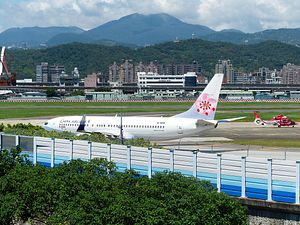With the coronavirus epidemic continuing to spread rapidly, particularly within China, major airlines around the world are cutting off service to the country. According to a count by Bloomberg, as of February 2, Australia’s Qantas Airways, Air Canada, Air France, Germany’s Lufthansa, Air India, Qatar Airways, American Airlines, and the United States’ Delta Air Lines — among many others — have all suspended or restricted flights to and from China.
Italy and Vietnam both banned flight connections to Taiwan as well.
As Reuters explained, Italy’s ban on Taiwan flights came about because the World Health Organization (WHO) classifies Taiwan as part of China. Even though the island is independently governed, the government in Beijing claims it as part of the People’s Republic, and has long blocked Taiwan’s participation in international bodies, even nonpolitical ones like the WHO.
The WHO recently classified the new coronavirus outbreak as a “global health emergency” but even then, the most recent travel advice posted on its website “advises against the application of any restrictions of international traffic.”
Taiwan currently has reported 10 cases of the new coronavirus and no deaths, compared to 17,306 cases and 361 deaths in mainland China.
The International Civil Aviation Organization (ICAO) also classifies Taiwan as part of China, and last week was apparently engaged in blocking users on Twitter who criticized or questioned that policy. The U.S. State Department blasted ICAO’s social media move as “outrageous, unacceptable, and not befitting of a UN organization.”
Vietnam’s 90-day ban on flights to and from Taiwan was apparently driven by a similar rationale, but that ban was lifted after lobbying from Taiwan government officials. In the interim, however, the ban caused serious headaches for Taiwanese airlines, as the state-run Central News Agency reported:
Taiwanese startup airline StarLux Airlines had to abandon its flight JX1701 for Da Nang when it was notified by the tower at 3:22 p.m. before taking off that Vietnam had stopped all flights between Vietnam and China, Taiwan, Macau, and Hong Kong….
EVA Airways flight 385 actually took off for Hanoi at 3:01 p.m. but was forced to turn around in mid-air because of the restrictions and landed back at Taoyuan International Airport at around 5:20 p.m.
CNA added that “A move by Vietnam to ban flights between the two countries would have had severe ramifications, considering there are 245 flights a week from Taiwan to the Southeast Asian country a week, and Vietnam is a major investment and tourist destination for Taiwanese.” Hanoi’s quick about-face was thus a relief for Taiwan’s authorities.
Taiwan’s Civil Aeronautics Administration (CAA) has argued that Taiwan should not be covered by any flight bans, as it has seen fewer cases of the new coronavirus than countries like Japan (20 cases), Thailand (19), Singapore (18), and South Korea (15), none of which are being targeted for similar restrictions.
Italy, however, has refused to lift its decision to ban flights to and from Taiwan until April 28. According to CNA, that will impact Taiwan’s China Airlines (CAL) and Eva Airways:
As a result, CAL, which operates three round-trip flights per week between Taoyuan and Rome, has canceled its flights on Feb. 2 and Feb. 3, while the company is currently trying to persuade the Italian authorities to reverse the decision…
The move also impacted EVA, which was set to start direct flights between Taoyuan and Milan on Feb. 18.
The CAA believes that Italy’s decision was “the result of a misunderstanding,” CNA reported, adding that the aviation body “is seeking to clarify the situation with the Italian authorities through various channels.”
In the meantime, Taiwan has also gone on the offensive, Reuters reports, sending its diplomats to proactively ask other countries not to shut off air traffic with Taiwan. Foreign Minister Joseph Wu said that Taiwanese diplomats were explaining that the WHO’s categorization of Taiwan as part of China was wrong, and air traffic should not be restricted on that basis.
“Taiwan is Taiwan. Taiwan is not a part of the People’s Republic of China,” Wu said, according to Reuters. “This simple reality the WHO should not get wrong.” He pointed to Taiwan’s separate systems for both disease control and air traffic management as further justification for different approaches to Taiwan and China amid the coronavirus outbreak.
In 2018, Beijing instituted a pressure campaign to force airlines around the world to classify Taiwan as part of China in information on flights to the island. As The New York Times reported, in April of that year “the Civil Aviation Administration of China sent a letter to 44 foreign airlines demanding they change their websites if Taiwan, Hong Kong or Macau was classified as a country.” With their access to lucrative air routes to China at stake, most international airlines eventually complied. Amid the coronavirus outbreak, we’re seeing some of the real world consequences of that confusion over Taiwan’s status.

































